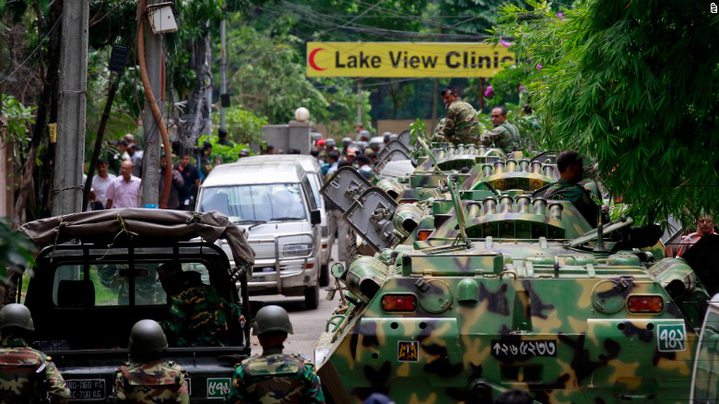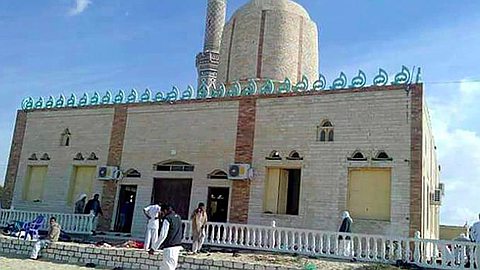Bangladesh Is Losing the Battle Against Terror

For Bangladesh, a Muslim-majority nation long synonymous with a relaxed form of Islam inflected with Bengali culture, the attack claimed by Islamic State ends the myth that the country is resistant to global jihadism. It also punctured, yet again, the notion that Islamist terrorism springs from poverty. Most of the six attackers came from privileged backgrounds. On social media, they flaunted allegiance to English Premier League soccer teams, not to the Islamic State’s Abu Bakr al Baghdadi.
The attack also highlights how the three largest South Asian countries—India, Pakistan and Bangladesh—lag in their efforts to tackle an enemy both vicious and protean. Each country faces a different challenge from terrorism. But as long as they all battle individual terrorist and Islamist groups, rather than the toxic ideology that binds them, these nations will continue to fall short.
In Bangladesh, Prime Minister Sheikh Hasina has arguably shown more commitment toward combating Islamism, the ideology that seeks to order every aspect of society and the state according to Shariah law, than any other leader in the region. Braving international criticism, Ms. Hasina has held war-crimes trials to prosecute prominent Islamists allegedly responsible for mass murder during Bangladesh’s bloody 1971 war of independence from Pakistan.
Over the past 21/2 years, Bangladesh has executed five people for war crimes. In May it hanged Motiur Rahman Nizami, a former Bangladesh chapter head of the Islamist group Jamaat-e-Islami. Ms. Hasina accuses Jamaat-e-Islami, whose violent offshoots include the Students Islamic Movement of India and Pakistan’s Hizbul Mujahideen, of a series of killings to destabilize Bangladesh.
Across the subcontinent, Jamaat-e-Islami plays a role similar to the one that the Muslim Brotherhood plays in the Arab world. Since its founding by the Islamic scholar Abul Ala Maududi in 1941 British India, Jamaat-e-Islami has done more than any other organization in South Asia to propagate the idea that God’s law is superior to law legislated by elected governments.
Her vaunted toughness notwithstanding, Ms. Hasina has fallen short in waging a war of ideas. Over the past three years, Islamist militants have murdered around 50 people, including secular and atheist bloggers, Hindu and Buddhist priests, and foreign aid workers. Instead of standing up for the slain bloggers, Ms. Hasina suggested that they went too far in criticizing Islam, implying that they deserved their fate.
At the same time, Ms. Hasina steadfastly refused to acknowledge what has become increasingly obvious to many Bangladesh watchers: that both the Islamic State and al Qaeda attract supporters in the country.
The government instead ascribes all violence to local groups such as Jamaat-e-Islami, Jamaatul Mujahideen and Ansarullah Bangla Team. As though to underscore the hollowness of this point, Islamic State’s Amaq news agency released pictures of five of the Dhaka attackers—each in a red-and-white Arab keffiyeh and wielding an assault rifle—posed before the group’s black banner.
Not surprisingly, the situation is more dire in Pakistan, where the powerful army and its notorious Inter-Services Intelligence have long nurtured jihadists to fight Indians in Kashmir, and Afghans and Americans in Afghanistan.
Since the Pakistani Taliban massacred 132 students in Peshawar in 2014, the army has stepped up a highly publicized fight against terrorism. Army chief Gen. Raheel Sharif deserves credit for going further than his predecessors by targeting the Pakistani Taliban in North Waziristan and the murderous anti-Shia group Lashkar-e-Jhangvi. But Pakistan’s strategic shift is not nearly as dramatic as its supporters claim.
On Wednesday, Lashkar-e-Taiba founder Hafiz Mohammed Saeed led Ramadan prayers in Lahore, where he called on Muslims to “fail the design of infidels.” Mr. Saeed has a $10 million bounty on his head for his alleged role in the 2008 Mumbai attacks that killed 166 people, including six Americans.
Meanwhile another terrorist group, Jaish-e-Mohammed, openly gathers alms in Karachi for jihad in India. The Afghan Taliban and Haqqani Network, both operating from safe havens in Pakistan, continue to destabilize Afghanistan. On June 30, the Taliban killed at least 37 people in an attack on Afghan police cadets outside Kabul.
Extreme Islamist ideas also flourish in India, where Muslims make up only about 14% of the country’s 1.3 billion people. On his Facebook page, one of the Dhaka killers shared the radical Mumbai-based preacher Zakir Naik’s exhortation urging all Muslims “to be terrorists.” He suggests the death penalty for homosexuals and for apostasy from Islam. Mr. Naik, barred from entering the U.K. and Canada for espousing violence, runs a global media empire from India.
In the end the Dhaka killers are merely a symptom. The disease itself is the unconstrained propagation of hateful views, including when preachers like Messrs. Saeed and Naik preach violence. Until Bangladesh, India and Pakistan curb this menace, terrorism in South Asia will not subside.




